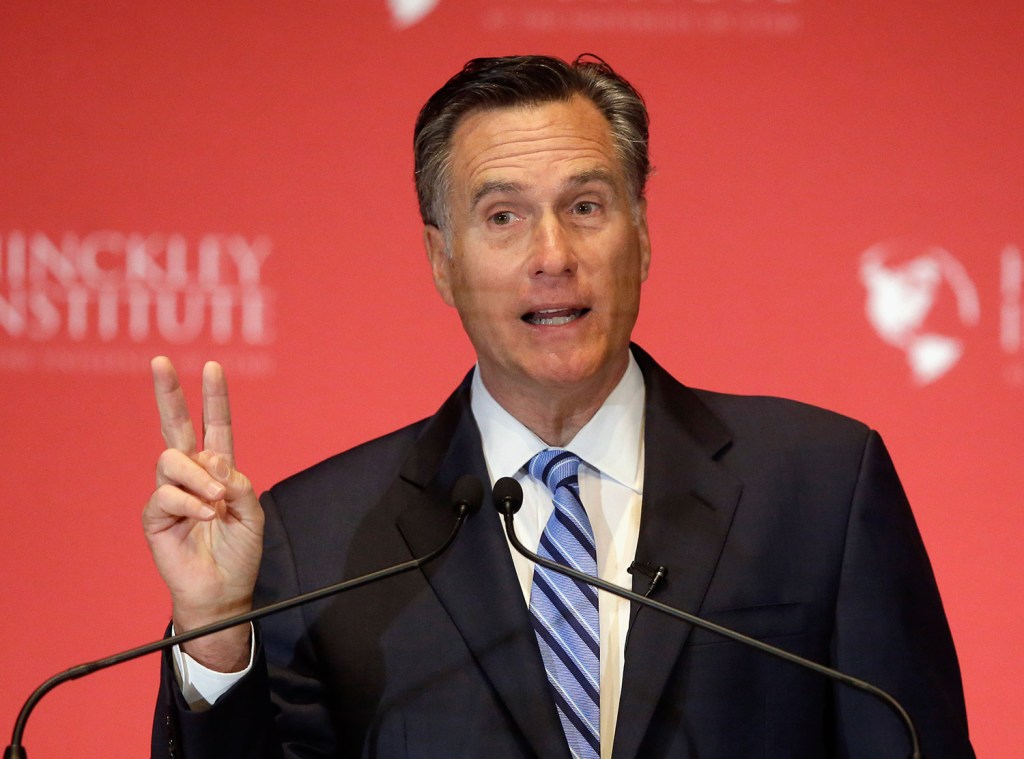WASHINGTON — The Republican civil war over Donald Trump is now raging in full fury.
Mitt Romney’s extraordinary takedown of the Republicans’ 2016 front-runner Thursday – he cited Trump’s “bullying, the greed, the showing off, the misogyny” – was the most potent signal yet that the Republican establishment desperately wants to stop the brash business mogul from wining the 2016 nomination. Never in recent political history has the previous party presidential nominee so blatantly, brutally railed against the next in line.
Insiders, seeing a calamity not only for Republican White House hopes but also for prospects of keeping the Senate majority, are frantically trying to organize and fund someone else. They face daunting odds. The trouble is that having someone such as Romney lead the anti-Trump charge might make the task more difficult.
“He’s exactly the kind of establishment person people were turning against,” said Patrick Murray, director of the Monmouth University Polling Institute.
Also, the anti-Trump candidates continue to split the vote. As long as three prominent challengers stay in the race, Trump’s path remains easier. And starting March 15, states can award all their convention delegates to the winner, no matter how small the percentage.
“The only thing that’s going to hurt him is consolidation of the field,” said Sen. Lindsey Graham, R-S.C., a vocal Trump critic, And Graham doesn’t see that happening anytime soon.
There also was a growing sense Thursday that many regulars are resigned to Trump as the nominee.
“He’s not the person I voted for, but if he’s the nominee I’ll vote for him,” said Rep. Bill Flores, R-Texas. “Look at the alternative.”
Indeed, the idea of a President Hillary Clinton was enough to motivate some Republicans to go with Trump. “I always tell people, vote your ideals in the primary but vote for Republicans in the general,” said Rep. Doug LaMalfa, R-Calif.
Not even the big money people are eager to hop on a stop-Trump bandwagon. The Koch brothers, whose political network pledged $889 million last year to influence policy and politics, “have no plans to get involved in the primary,” James Davis, spokesman for Freedom Partners, their political arm, said Thursday. The group is more inclined to use its resources to help elect a Republican in November.
Romney’s call to arms did grab attention for the stop-Trump movement. It blew up chatter on Twitter, where “Romney” was a trending topic.
“He’s playing the members of the American public for suckers. He gets a free ride to the White House and all we get is a lousy hat,” Romney said in remarks at the University of Utah. “His domestic policies would lead to recession. His foreign policies would make America and the world less safe.”
Trump responded during a campaign stop in Maine, recalling how Romney had sought his 2012 endorsement. “I could have said, ‘Mitt, drop to your knees’; he would have dropped to his knees,” Trump said.
Romney’s speech was not a surprise.
Romney loyalists and conservative groups have been trying to build an effort to stop Trump. “The most liberal, big-government candidate in the Republican race,” said David McIntosh, president of the conservative Club for Growth. Our Principles PAC, founded by top 2012 Romney campaign aide Katie Packer, is running ads recalling Trump’s ties to Democrats and raising questions about his record.
Establishment insiders are particularly concerned about Trump’s effect on Senate races.
“We can’t have a nominee be an albatross around the down-ballot races,” Senate Majority Whip John Cornyn, R-Texas, told CNN when asked about Trump.
Republicans hold 24 of the 34 Senate seats that are up for re-election in November. Seven Republican seats are in states that President Obama carried in 2012.
With a Trump candidacy, “the map gets much worse for Republicans,” said an analysis from political analyst and professor Larry Sabato’s Crystal Ball, a nonpartisan research group at the University of Virginia.
Republican-held seats in Florida, New Hampshire and Pennsylvania would lean more toward Democrats, while Ohio would become a toss-up. Democrats need a net gain of five seats to win a Senate majority, four if their presidential nominee wins.
Send questions/comments to the editors.



Success. Please wait for the page to reload. If the page does not reload within 5 seconds, please refresh the page.
Enter your email and password to access comments.
Hi, to comment on stories you must . This profile is in addition to your subscription and website login.
Already have a commenting profile? .
Invalid username/password.
Please check your email to confirm and complete your registration.
Only subscribers are eligible to post comments. Please subscribe or login first for digital access. Here’s why.
Use the form below to reset your password. When you've submitted your account email, we will send an email with a reset code.